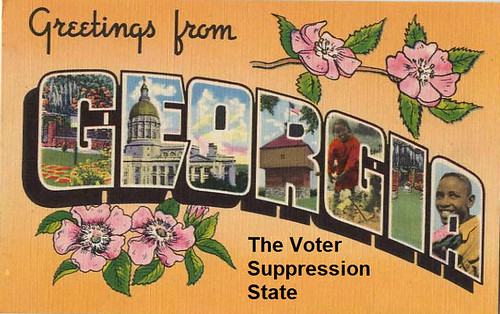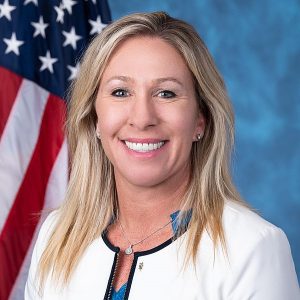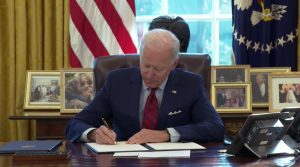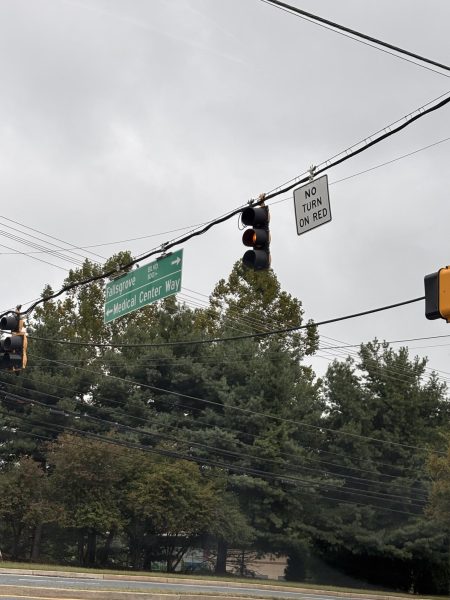Voter suppression laws are danger to democracy; H.R 1 must be passed

Photo by Mike Licht used with permission from Google Commons
Georgia takes center stage in GOP voter suppression controversy.
A flurry of voter suppression laws have been passed by Republicans in 43 states, aiming to reduce the record voter turnout in the 2020 election from occuring again. Georgia has become the epicenter of this crisis. In Georgia, Democrats elected President Joe Biden in November, and Senators Rapheal Warnock and Jon Ossoff in January. In response, the Republican-controlled state House and Senate passed perhaps the most anti-voting rights bills since reconstruction.
The bill would require a photo ID for absentee voting, disenfranchise the poor, limit the amount of time voters have to request an absentee ballot, restrict where ballot drop boxes could be located and when they could be accessed, and limit early voting hours on weekends, according to theAssociated Press.
It’s quite clear why Republicans are doing this, both in Georgia, and across the country. It would be easier for them to win elections if certain groups of people didn’t vote. Instead of respecting democracy, and competing for those votes, they have decided to make it harder for people less likely to vote for them, and they hide behind the “problem” of voter fraud.
Voter fraud is the most common justification by Republicans for these laws. Everyone wants fraud-free elections. So what’s the problem? Fraud is extremely insignificant. According to the Brennan Center for Justice, “elections had been meticulously studied for voter fraud, and found incident rates between 0.0003 percent and 0.0025 percent.” The report noted that an American “will be struck by lightning more than he will impersonate another voter at the polls.”
So how can these laws be stopped? What can be done to protect the right to vote? Look no further than H.R 1, known as the For The People Act. Not only does this bill stop restrictive voter suppression laws in their tracks, it is a long needed overhaul of our democracy. The act requires states to offer online voter registration systems, which 40 states already allow, and same-day voter registration during federal elections.
It would also require local officials to automatically register eligible voters. The bill would require states to allow all voters the option of voting by mail, and it would mandate 15 consecutive days of in-person early voting for at least 10 hours a day. States would be required to notify voters seven days before elections if their polling places have changed, according to NBC News.)Long wait times to vote have disproportionately hurt minorities and lower-income voters. The bill forces states to address long wait times on Election Day, requiring the allocation of enough resources to ensure that voters don’t wait longer than 30 minutes, according to ABC.
It would also end partisan gerrymandering, used by both parties, but more often than not by Republicans, according to an Associated Press analysis. For all their complaining about nonexistent voter fraud, if Republicans genuinely support efforts to prevent attacks on our elections, this bill would actually help the security of elections, by improving cybersecurity, according to The Atlantic.
The bill would create a system of public financing for Congressional candidates that would match donations under $200 with six times the funding if the candidates agreed to rules that would include not accepting donations over $1,000. Candidates would be required to disclose all contributions and return unspent public funds over $100,000, according toNBC News.
The For The People Act is essential. It reforms our campaign finance system, makes it easier to vote, and puts the power back into the hands of the people, where it belongs in a democracy. The House has passed it, and it faces an uncertain fate in the Senate. Our democracy depends on the courage of a few Senators, and their willingness to abandon or reform the filibuster, as former President Obama accurately called it “a Jim Crow relic.”
Your donation will support the student journalists of Thomas S. Wootton High School. Your contribution will allow us to purchase equipment and cover our annual website hosting costs.
Ethan is a 2023 graduate.









